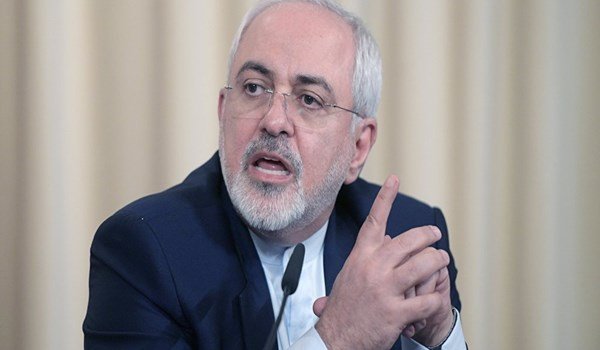Zarif urges Pompeo to study UN Resolution 2231

TEHRAN – The U.S. secretary of state needs to study the UN Security Council Resolution 2231, Foreign Minister Mohammad Javad Zarif has suggested in reaction to Mike Pompeo’s tweet which claimed that Iran’s missile testing activities violate the resolution.
Resolution 2231, adopted unanimously by the UN Security Council in July 2015, endorses the nuclear agreement between Iran, the 5+1 group, and the European Union. However, the United States, under Donald Trump, unilaterally withdrew from the agreement in May and ordered sanctions on Iran.
In an interview with ICANA published on Tuesday, Zarif stated that Pompeo does not value the UN resolution at all.
“This is not unexpected of him,” Zarif remarked.
He added, “Notwithstanding their international commitments, they [the U.S. officials] ditched the nuclear deal; besides, they punish those who implement the deal.”
The Iranian foreign minister highlighted that the JCPOA – the official name for the nuclear deal - does not prohibit Iran from testing missiles, and that the Resolution 2231 only requests Iran not to test nuclear-capable missiles.
It does not prohibit Iran from testing missiles, the chief diplomat added.
“Iran is not after nuclear weapons, and these missiles are not designed to carry nuclear weapons.”
Underlining that missiles designed for carrying nuclear weapons do not require high degrees of precision, Zarif concluded that Iran’s missiles, for their high precision, are not the product of a nuke program.
“In the recent attack on the terrorists [in Iraq’s Kurdistan Region], Iran showed that its missiles are highly precise-guided.”
------‘Oil export, pivotal to EU-Iran trade mechanism’
Also, in reaction to a recent news article by Reuters which claimed that the SPV, even if established, may not contribute to Iran’s oil export to Europe, Zarif said the SPV is a European-proposed payment mechanism to ensure that Iran continues international trade despite U.S. sanctions.
Citing unnamed European diplomats on Nov. 28, Reuters said though France and Germany are going to take joint responsibility for the trade mechanism, few believe the mechanism will cover oil sales, and it could be scaled back to encompass only less sensitive items such as humanitarian and food products.
Zarif said that the remarks - which were attributed to unknown sources - are “inaccurate”.
“According to the received information, this could not be true because if the income from oil trade is not deposited into an account, it is not clear whether there is any money for conducting any transactions.”
Zarif noted that oil is the major export of Iran, therefore some people are trying to create an atmosphere in order to make people lose their hope.
He further said, “The Islamic Republic of Iran has always insisted on its own internal strength. As a result, we continued our efforts with the Europeans.”
------‘Europeans should pay for their security’
The foreign minister stressed that the JCPOA is crucial to the security of Europe and therefore “they have to pay for the implementation of the JCPOA and their own security.”
“We are in touch with the Europeans and following up on the technical issues to make sure the trade mechanism is developed. We hope the SPV can meet the needs of the country to an acceptable extent.”
Pointing to the significance of getting a practical guarantee for the implementation of the SPV, Zarif said though Iranian officials have received positive preliminary information concerning the establishment of the mechanism, excessive cautiousness can be sensed on the part of the Europeans.
“Europeans want to reap the benefits of the JCPOA without having to pay for alleviating their security concerns, and this is not possible,” Zarif stressed.
SP/PA
Leave a Comment